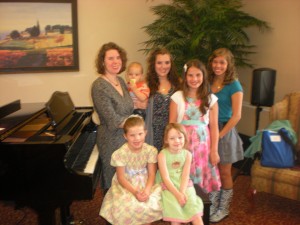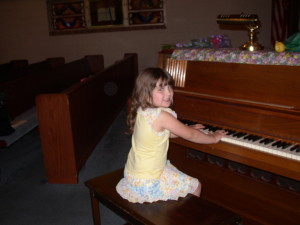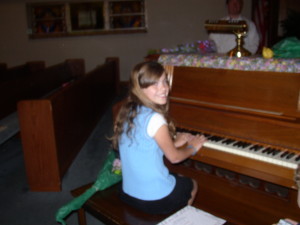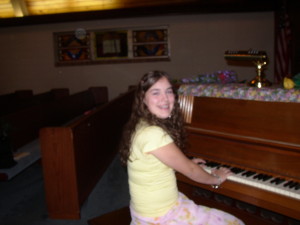“When is my child ready for piano lessons?” or “How old does my child have to be to take piano lessons?” These are two frequently asked questions I am asked by parents of young children. I began my career teaching piano lessons to children in my senior year of college almost twenty years ago. Since then, I have taught hundreds of lessons – most to children but some adults, too. As a rule, I have told parents to wait until the child is six years old and he or she has begun to read. However, a few years ago, before I became a trained Music Together teacher, I advertised lessons for four and five year old children. I had four families contact me and I gave each child six weeks of individual lessons using the a lesson book for pre-readers. This really wasn’t an experiment, but I learned some lessons of my own along the way.
1) Children at the age four and five are wiggly. Sitting on a piano bench for even twenty minutes is difficult because, developmentally, their bodies want to move to the music.
2) Fine motor skills are still working to develop so the learning curve on mastering a simple five finger scale is steep and often frustrating to the child.
3) Parents have to sit and “practice” with the child… Every. Single. Day. Refer to #1: “children are wiggly.” If the parent wants their child to learn how to play the piano or any other instrument, it will take great patience to keep a four year old on task to get through a piano practice assignment. As they finish Kindergarten and start first grade, most children have gained experience to sit and listen for a longer period of time. Although some parental involvement in practice is always encouraged, a six year old is far better able to to read and understand their practice assignments than a four year old.
4) Music Together classes are designed for children under five years old. Music Together sought me out because I had a background in music education. After reading their research and taking the teacher training course, I was hooked. The classes allow them to be wiggly and have fun within active music making. The parent still needs to be involved, but it’s learning through play, experimentation, and modeling grownups, not formal sit down practice. In my experience, it is less work for the parent, more enjoyable for the kid, and makes happier families.
After the six weeks of lessons were over, I retained one student who was four years old. I kept her on because her mom was highly involved in keeping up with her practice and she had an exceptional sense of rhythm and melody. As I later found out, her mom had taken her to several semesters of another local parent-child music class. I could tell this child had some “experience” in music and had almost achieved what Music Together calls “basic music competence.” Basic music competence happens when a child achieves an improved sense of rhythm and can sing in tune to simple songs. If a child takes multiple semesters of Music Together classes and is supported by musical play in class and at home, basic music competence can easily be achieved by the age of five. By the time a child is six, he or she is ready for private lessons and is more likely to succeed because they have already found a love in making music.
So, here is my answer to the original questions: If the child is six or older, it is a good time to begin private music lessons. Before then, enroll your child in Music Together classes to help build your child’s competence and confidence in active music making. I am passionate about how these classes prepare babies and young children for a lifetime love of music. It’s a win-win solution.



